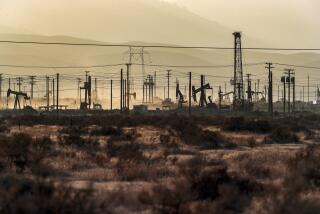2 top prosecutors sue Southern California over Porter Ranch leak
The Southern California Gas Co. was charged Tuesday with failing to immediately notify state authorities of a natural gas leak in Aliso Canyon.
The Los Angeles County District Attorney’s Office filed four misdemeanors against the gas company for allegedly releasing air contaminants and neglecting to report the release of hazardous materials until three days after the leak began Oct. 23.
“We will do everything we can as prosecutors to help ensure that the Aliso Canyon facility is brought into compliance. I believe we can best serve our community using the sanctions available through a criminal conviction to prevent similar public health threats in the future,” District Attorney Jackie Lacey said in a statement.
The charges could result in a maximum fine of $25,000 a day for each day the leak went unreported and $1,000 a day for each day the well has polluted. An arraignment is scheduled for Feb. 17 in Santa Clarita.
“We have just been notified of this filing and we are still reviewing it. We have been working with regulatory agencies to mitigate the odors associated with the natural gas leak and to abate the gas leak as quickly as safety allows. We will defend ourselves vigorously through the judicial process,” said Kristine Lloyd, a spokeswoman for the utility.
The leaking well has released about 80,000 metric tons of methane, a number that continues to grow. Noxious fumes from odorants in the leak have driven residents out of more than 5,000 homes in Porter Ranch and the surrounding communities, the utility has said. Residents in that area have complained of headaches, nosebleeds and nausea, which are short-term symptoms associated with the smell in the methane.
The criminal charges came hours after state Atty. Gen. Kamala Harris joined those suing Southern California Gas Co. Harris said the litigation was necessary to hold the utility accountable.
The attorney general’s action amends a civil suit filed in early December by Los Angeles city and county officials in Superior Court. The revised joint complaint accuses the gas company of violating health and safety codes, public nuisance laws and hazardous materials reporting requirements, as well as engaging in unfair business practices. The suit seeks civil penalties, restitution and injunctions to enforce regulations.
Harris’ joining in the litigation brings to 11 the number of local, state and federal agencies now either investigating or suing the gas company. Her office is the only one that can press some claims, such as alleging statewide harm through greenhouse gas emissions.
“Quite frankly, it’s not litigation overkill at all,” said L.A. City Councilman Mitchell Englander, who represents communities affected by the leak. “The damage the gas has caused to residents, the environment, the economy, is unprecedented.”
Though the amount of gas escaping from the company’s Aliso Canyon underground storage field has fallen since peaking in late November, the utility does not expect to be able to attempt to stop the leak until late this month.
The lawsuit includes yet-unnamed corporate officers of the gas company who were in a position of responsibility to either prevent, or immediately correct, the leak. Southern California Gas Co. is owned by San Diego-based Sempra Energy.
In a news release, the attorney general’s office said it was best suited to coordinate multiple agency claims while seeking to force the gas company to address the environmental effects of such a large release of methane. The gas has a short life span in the atmosphere but has a powerful greenhouse effect in trapping the Earth’s heat radiation.
“Against the backdrop of California’s ongoing efforts to reduce [greenhouse gas] emissions generally, this leak is a monumental environmental disaster,” the lawsuit contends.
Harris is representing both her office and the California Air Resources Board.
The attorney general “is already serving a crucial coordinating role” with state, federal and local agencies, her office said. That effort includes mapping out what potential enforcement actions those agencies can take against the gas company.
The behind-the-scenes coordination and lack of public involvement in the leak investigation have been criticized by some consumer advocates.
“This is a coup of government agencies working in secrecy, to figure out how they don’t step on each others’ toes,” said Jamie Court, president of Consumer Watchdog, a California nonprofit organization frequently involved in insurance and utility regulation.
“The public needs to be part of this process,” Court said. “There are too many political alliances and allegiances here.”
Also on Tuesday, Reps. Steve Knight (R-Palmdale) and Brad Sherman (D-Porter Ranch) filed separate pieces of federal legislation requiring the Department of Transportation to set safety standards for natural gas storage facilities.
The agency’s Pipeline Hazardous Materials Safety Administration regulates transportation of natural gas; it has the authority to regulate gas storage as well, but has mostly left that to state officials.
Knight said he expected his legislation to be heard by the House Committee on Transportation and Infrastructure later this month. President Obama and Vice President Joe Biden assured Sherman last week that they would push the agency to issue the regulations without congressional action. Sherman said Tuesday that he filed the bill as a backup to their promise.
Times staff writers Sarah D. Wire in Washington and Alice Walton in Los Angeles contributed to this report.
MORE ON THE PORTER RANCH LEAK
No, the gas leak hasn’t turned Porter Ranch into a ghost town
California Senate moves to keep gas company from using wells near Porter Ranch
More to Read
Sign up for Essential California
The most important California stories and recommendations in your inbox every morning.
You may occasionally receive promotional content from the Los Angeles Times.











